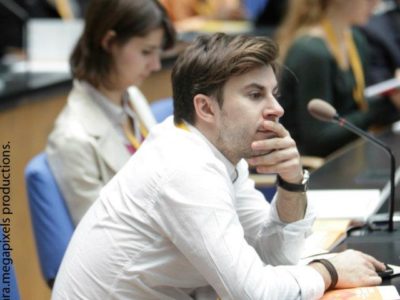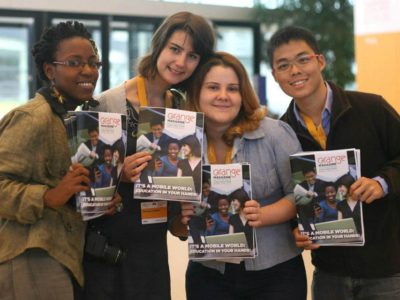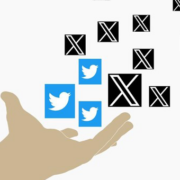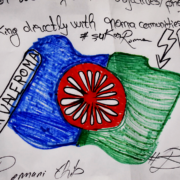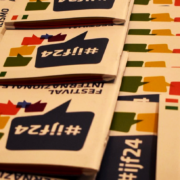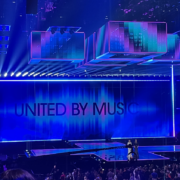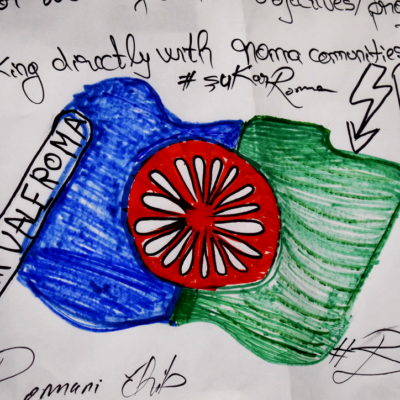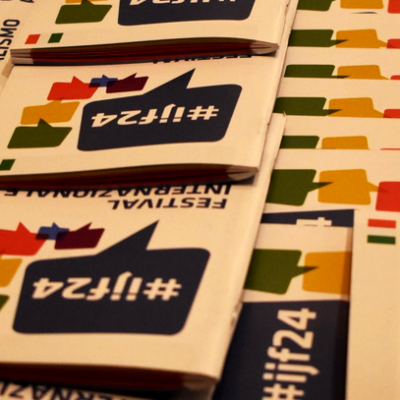“Auntyji, I really need your help. I’m 18 years old and I masturbate at least once a day. I’ve been told this is an illness and that I can make myself sick. How can I stop?” asks a youngster living in Hyderabad, India.
From his desk in New Delhi, Kuber Sharma checks dozens of e-mails a week. None, however are written for him, they are for his online alter-ego Auntyji, an “aunt” who understands agony, and shares her maternal wisdom with confused and troubled Indian youth.
Sharma works as a blogger for Love Matters, a Dutch-based website that set itself a daring goal: make it possible for people to talk about taboos in conservative societies, placing topics such as homosexuality, pregnancy, sexual harassment or basic genital anatomy out in the public.
“In a lot of cases the information is forbidden and when it’s there, it is just wrong and sometimes scary. And none of the information out there talks about pleasure, which along with sexual health, is a big component of your sexuality,” explains the project coordinator, Michele Ernsting.
India, where Love Matters opened its first international operation, proves her point immediately: half of the states ban sexual education and the other half makes it optional. And when it is taught, the instructors have rarely had sex education themselves.
Surprisingly, the county’s National Family Health Survey showed in 2006 that 80% of men and 62% of women believed that children should be taught about AIDS/HIV at school. And the most searched term in Google India is “how to kiss.”
Launched in South East Asia in July 2011 by Radio Netherlands Worldwide (RNW), the site promptly unveiled the existence of a large audience craving for this information. Every month, almost 150,000 users access the website, with an outstanding average visit of 9 minutes on the Hindi site.
Why is it so popular? Perhaps because it breaks sex down to the basics, with sections that explain, piece by piece, how the male and female bodies work, first- time sex (supremely popular in terms of traffic), relationships (both gay and straight), and almost every conceivable topic connected with sexuality. It is, essentially, the whole sexual education syllabus in a single website.
“We try to be non-judgmental, using language that is as clear as possible and we never say to people you shouldn’t do this or that. We say, if you do it, this will happen and you might get sick. You can look at porn for example, but just remember that is not how relationships work in the real world,” states the coordinator.
Your house, your voice
When Ernsting first came up with the idea of the site, after witnessing a Dutch website on the topic, she was sure about one thing: they needed people on the field to develop the project. After contacting RNW’s partners all over the world, the Indians were quick to answer the call.
“The Dutch perspective on sexuality in one of openness; the Indian approach is hypocritical and largely one of silence. So it is important to be mindful of the culture and to not be too explicit in certain places. That is why it was necessary to have an Indian partner in the process,” uttered Radhika Chandiramani from the Indian non-governmental organization TARSHI (Talking About Reproductive and Sexual Health Issues), who has been closely working on the subject since 1996.
It’s a win-win situation for both parties: the non- profit NGO guarantees that its audience receives appropriate sexual content while getting rid of any legal hazard, and Love Matters makes sure they don’t collide with a local project, while being unapologetic about the need of a local partner to balance their Dutch perspective.
TARSHI was commissioned to translate the content, both literally and culturally, Hindi and to Indian society so Love Matters could reach a broader audience. In November 2011, the new site was operational, and by 2012 it had become the flagship of the whole project, outrunning its English language equivalent both in visits and in time spent on the site.
“I can safely say that the Hindi website is the most unique knowledge base on sex and sexual practices in India, while the English version is one of the leading portals as well,” concludes Sharma-Auntyji.
Mobile is the place to be
Almost half of the visits Love Matters have in India come from mobile phones; in Pakistan it’s the overwhelming majority. Previous research in Delhi and Mumbai showed that the youths were willing to access sexual health information online, but from the privacy of their phones.
Mobile phones are a bypass around figures of authority such as parents or teachers that may censor the information provided by Love Matters. While a computer screen might be hard to conceal, small gadgets provide the necessary privacy for youths to freely access the site.
“We know young people spend a huge amount of time on their mobiles, and they look at things like porn. They actually don’t have a problem looking at sex in their phones, so why not give them good information about sexuality as well as all the other stuff they are already looking at,” stated Ernsting.
The new African site, aimed at Kenya and Nigeria, is largely based on a mobile site that can provide users a friendlier experience while using their phones. With almost 71% of the population subscribed to a phone company in Kenya, and 55.8% in Nigeria, mobile is the place to be.
The Love Matters team understands that and intensively worksonFacebookandTwittertoengageuserswiththe site. They even launched a campaign of “sexy-love tips” to keep their audience posted, in the effort of providing as much information as possible to youths.
Meanwhile, Auntyji has already answered back: “Puttar, first of all take a deep breath. Breathe in. Breathe out. And now listen to me carefully: What you are doing is the most natural thing in the world.”




